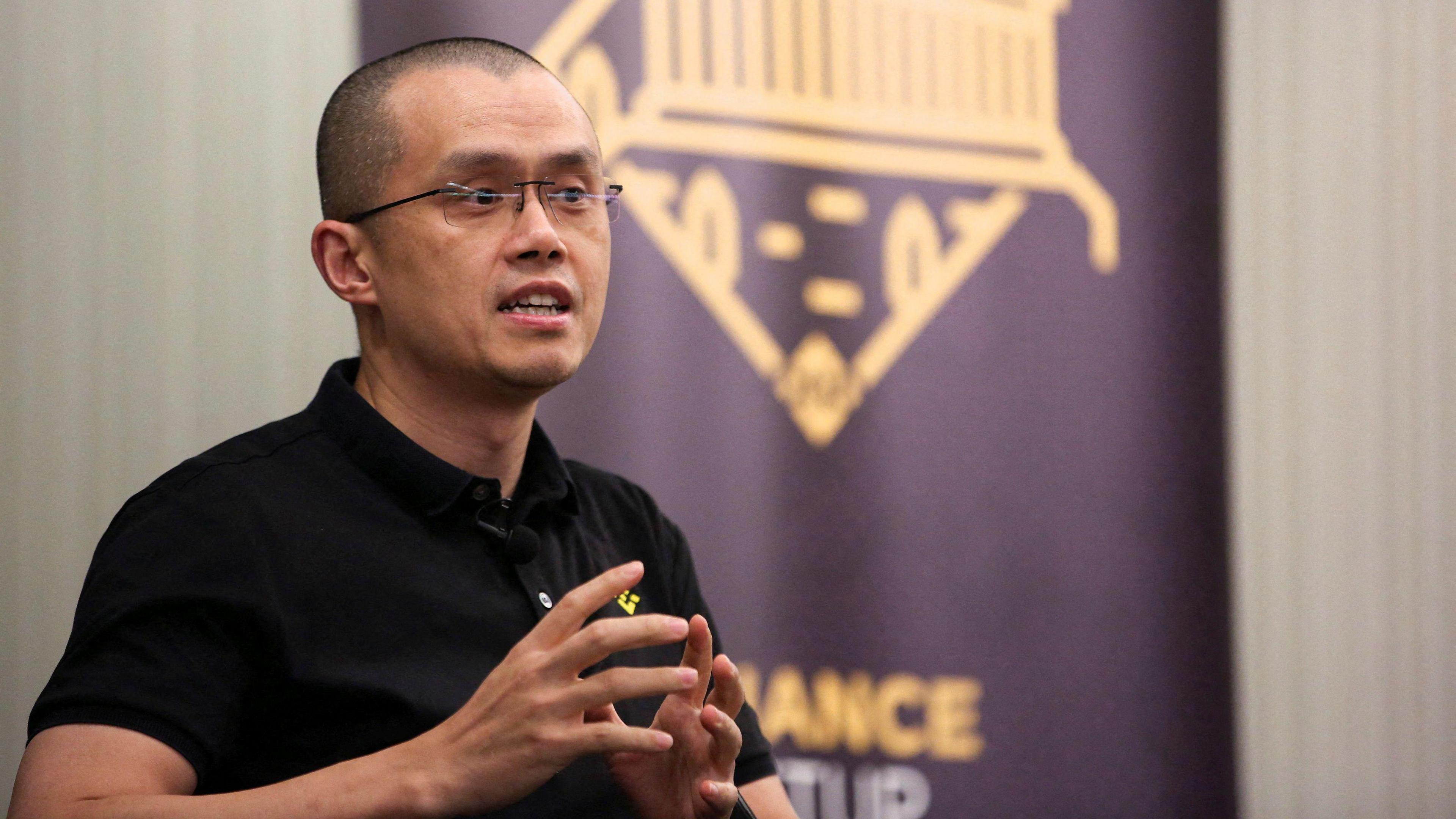Trump pardons Binance founder Changpeng Zhao

- Published
Changpeng Zhao, founder of the world's largest cryptocurrency exchange Binance, has been pardoned by US President Donald Trump.
Zhao, also known as "CZ", was sentenced to four months in prison in April 2024 after pleading guilty to violating US money laundering laws.
Binance also pleaded guilty and was ordered to pay $4.3bn (£3.4bn) after a US investigation found it helped users bypass sanctions.
The pardon reignited debate over the White House embrace of cryptocurrency as the Trump family's own investments in the industry have deepened.
White House Press Secretary Karoline Leavitt called Zhao's prosecution under the Biden administration part of a "war on cryptocurrency", pushing back on critics who said the pardon appeared motivated by Trump's personal financial interests.
"This was an overly prosecuted case by the Biden administration," she said, adding that the case had been "thoroughly reviewed". "So the president wants to correct this overreach of the Biden administration's misjustice and he exercised his constitutional authority to do so."
Binance had spent nearly a year pursuing a pardon for its former boss, who completed his four-month prison sentence in September 2024, the WSJ reported on Thursday, external.
Its campaign came as Trump, who released his own coin shortly ahead of his inauguration in January, promised to take a friendlier approach to the industry than his predecessor.
Since then, he has loosened regulations, sought to establish a national cryptocurrency reserve and pushed to make it easier for Americans to use retirement savings to invest in digital assets.
Zhao, who stepped down as Binance chief executive in 2023, wrote on social media on Thursday that he was "deeply grateful for today's pardon and to President Trump for upholding America's commitment to fairness, innovation, and justice".
The pardon lifts restrictions that had stopped Zhao from running financial ventures, but it's not yet clear whether it changes his standing with US regulators or his ability to lead Binance directly.
In a statement Binance called the decision "incredible news".
The exchange, which is registered in the Cayman Islands, remains the world's most popular platform for buying and selling cryptocurrencies and other digital assets.
It did not respond to further questions about the conflict of interest claims.
Before the pardon, Zhao's companies had partnered with firms linked to Trump on new digital-currency projects including Dominari Holdings, where his sons sit on the board of advisers and which is based in Trump Tower.
The Wall Street Journal also previously reported representatives of the Trump family - which has its own crypto firm World Liberty Financial - had recently held talks with Binance.
The Trump administration previously halted a fraud case against crypto entrepreneur Justin Sun, after his investments in the Trump family's crypto firm, World Liberty Financial.
He has also pardoned founders of the crypto exchange BitMEX, who also faced charges related to money laundering, and Ross Ulbricht, founder of the Silk Road, the dark web marketplace known as a place for drug trade.
Palantir co-founder Joe Lonsdale wrote on social media that he loved Trump but the president had been "terribly advised" on pardons.
"It makes it look like massive fraud is happening around him in this area," he said.
Senator Elizabeth Warren, a Democrat, blasted the decision in a statement as a "kind of corruption".
Asked about the decision to pardon Zhao on Thursday, Trump appeared not to not know who he was.
"Are you talking about the crypto person?" he asked, later saying he had granted the pardon at the "request of a lot of good people".
When US officials announced the Binance guilty plea in 2023, they said Binance and Zhao were responsible for "wilful violations" of US laws, which had threatened the financial system and national security.
"Binance turned a blind eye to its legal obligations in the pursuit of profit," said then-Treasury Secretary Janet Yellen.
"Its wilful failures allowed money to flow to terrorists, cybercriminals, and child abusers through its platform."
Zhao stepped down as Binance chief executive as part of the resolution of the case, writing at the time that resigning was "the right thing to do".
"I made mistakes, and I must take responsibility," he said, external.
Additional reporting by Bernd Debussman Jr
Trump and sons' stake in crypto firm worth $5bn
- Published2 September
From Bitcoin to XRP: Key cryptocurrency terms and what they mean
- Published14 July

Sign up for our Tech Decoded newsletter to follow the world's top tech stories and trends. Outside the UK? Sign up here.